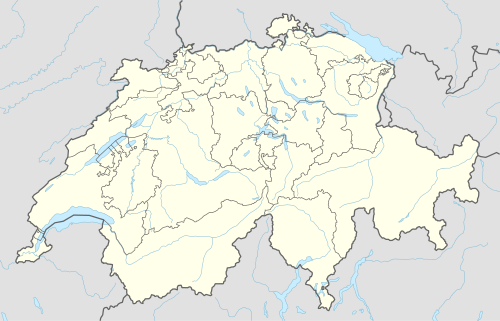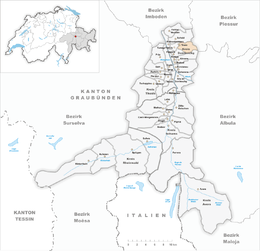Trans, Switzerland
| Trans | ||
|---|---|---|
| Former municipality of Switzerland | ||
| ||
 Trans | ||
|
Location of Trans  | ||
| Coordinates: 46°45′N 9°27′E / 46.750°N 9.450°ECoordinates: 46°45′N 9°27′E / 46.750°N 9.450°E | ||
| Country | Switzerland | |
| Canton | Graubünden | |
| District | Hinterrhein | |
| Government | ||
| • Mayor | Ursina Tester | |
| Area | ||
| • Total | 7.44 km2 (2.87 sq mi) | |
| Elevation | 1,473 m (4,833 ft) | |
| Population | ||
| • Total | 56 | |
| • Density | 7.5/km2 (19/sq mi) | |
| Postal code | 7417 | |
| SFOS number | 3641 | |
| Surrounded by | Almens, Churwalden, Paspels, Scheid, Tumegl/Tomils | |
| Website |
www SFSO statistics | |
Trans is a village in the municipality of Tomils in the district of Hinterrhein in the Swiss canton of Graubünden. In 2009 Trans merged with Feldis/Veulden, Scheid and Tumegl/Tomils to form the municipality of Tomils.[1]
History
Trans is first mentioned in the middle of the 12th Century as Hof ad Tranne.[2]
Geography
Trans has an area, as of 2006, of 7.4 km2 (2.9 sq mi). Of this area, 30.2% is used for agricultural purposes, while 46.4% is forested. Of the rest of the land, 1.3% is settled (buildings or roads) and the remainder (22%) is non-productive (rivers, glaciers or mountains).[3]
The municipality is located in the Domleschg sub-district, of the Hinterrhein district. It consisted of the haufendorf (an irregular, unplanned and quite closely packed village, built around a central square) village of Trans, located on a terrace 1,473 m (4,833 ft) above the eastern side of the Hinterrhine valley.
Demographics
Trans has a population (as of 2007) of 56, all Swiss. Over the last 10 years the population has decreased at a rate of -17.6%.[3]
As of 2000, the gender distribution of the population was 55.4% male and 44.6% female.[4] The age distribution, as of 2000, in Trans is; 8 people or 11.6% of the population are between 0 and 9 years old. 6 people or 8.7% are 10 to 14, and 4 people or 5.8% are 15 to 19. Of the adult population, 5 people or 7.2% of the population are between 20 and 29 years old. 7 people or 10.1% are 30 to 39, 11 people or 15.9% are 40 to 49, and 12 people or 17.4% are 50 to 59. The senior population distribution is 5 people or 7.2% of the population are between 60 and 69 years old, 4 people or 5.8% are 70 to 79, there are 7 people or 10.1% who are 80 to 89.[5]
In the 2007 federal election the most popular party was the SVP which received 66.9% of the vote. The next three most popular parties were the SPS (17.9%), the FDP (9%) and the CVP (4.8%).[3]
The entire Swiss population is generally well educated. In Trans about 52.8% of the population (between age 25-64) have completed either non-mandatory upper secondary education or additional higher education (either University or a Fachhochschule).[3]
Trans has an unemployment rate of 0%. As of 2005, there were 15 people employed in the primary economic sector and about 7 businesses involved in this sector. 4 people are employed in the secondary sector and there are 2 businesses in this sector. 4 people are employed in the tertiary sector, with 2 businesses in this sector.[3]
The historical population is given in the following table:[2]
| year | population |
|---|---|
| 1803 | 84 |
| 1850 | 104 |
| 1900 | 56 |
| 1950 | 61 |
| 2000 | 69 |
References
- ↑ Amtliches Gemeindeverzeichnis der Schweiz published by the Swiss Federal Statistical Office (German) accessed 23 September 2009
- 1 2 Trans in German, French and Italian in the online Historical Dictionary of Switzerland.
- 1 2 3 4 5 Swiss Federal Statistical Office accessed 05-Oct-2009
- ↑ Graubunden in Numbers (German) accessed 21 September 2009
- ↑ Graubunden Population Statistics (German) accessed 21 September 2009
External links
| Wikimedia Commons has media related to Trans, Switzerland. |
- Official website (German)
- Trans in German, French and Italian in the online Historical Dictionary of Switzerland.
